A decade of excellence: The Skating School's journey
Part I. From vision to reality
April 8, 2025
By Reut Golinsky
Photo © Iana Saveleva, Yuan Tian, Reut Golinsky
In August 2024, the Skating School of Switzerland celebrated its first decade alongside friends, staff, the Champéry community, and fans with the spectacular show "The Sorcerer's Apprentice." This milestone offered a wonderful opportunity to reflect on their journey so far and imagine what's next. Throughout the season, we spoke with the school's founders, as well as the coaches and students, to gain insight into what makes this place special.
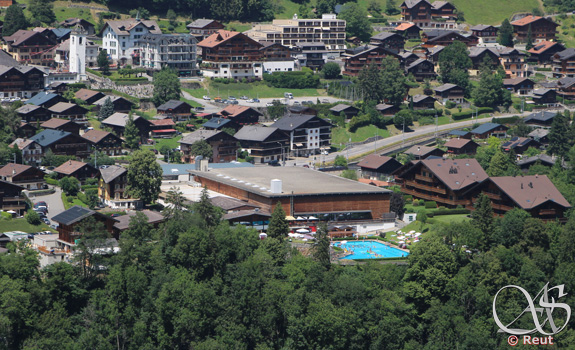
For those following the news from afar, it seemed to come out of the blue: four years after Stéphane Lambiel's official retirement, and in the midst of a successful career as a professional skater with a busy schedule of tours in Asia and Europe, a new Facebook page appeared in early June 2014 along with an announcement: "The Skating School of Switzerland is excited to present its Summer Camp 2015." A summer camp? The school? What? When? How?
"The initial idea that Chris (Trevisan) and I had was to create a summer camp," Stéphane recalls. "At that time, I wasn't sure if I wanted to coach permanently, but I really wanted to share my experience. I had conducted a couple of seminars in Japan, Finland, and Berlin, and I got the opportunity to work with several federations. 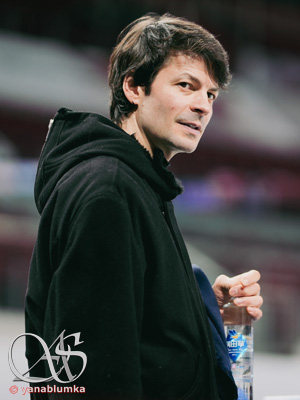 While doing that, I noticed how much I loved sharing, understanding skating more deeply, and discovering personalities - that was the most interesting aspect for me.
While doing that, I noticed how much I loved sharing, understanding skating more deeply, and discovering personalities - that was the most interesting aspect for me.
In addition to that, I was also assisting Peter (Grütter) with Noah and Noémie Bodenstein. It was difficult for them because they lived in Lausanne but practiced with Peter in Geneva, so when they trained in Lausanne, they didn't have much supervision. I was living in Lausanne at the time, so I helped them when they were there. That experience also gave me a taste of coaching, but I didn't have my own students at that point. The challenge was really: okay, let's do a summer camp, let's start from that.
As we began talking about it and filling up the summer camp, some skaters not only registered for the camp but also asked for more attention from me. That encouraged me to start helping them. Once I dip my toes into something I enjoy, it's very hard for me to step back. Once I committed to helping them, I gave it my all - I was fully invested in finding ways to support them and help them progress. And that's how the idea began to grow into what would eventually become a school."
The first time we visited Champéry was in September 2015. Swiss schoolchildren have every Wednesday afternoon off, which is typically designated for sports or extracurricular activities. The Skating School seized this opportunity to hold weekly boot camps, consisting of a few intense hours of both on-ice and off-ice training. The sessions alternated between working as a whole group and splitting into three smaller groups, each with its own dedicated coach - Anna Bernauer (now Dierking), Robert Dierking, or Stéphane - who focused on different aspects of skating. While the pace was high and there was little time to waste, it was clear that the kids genuinely enjoyed the process.
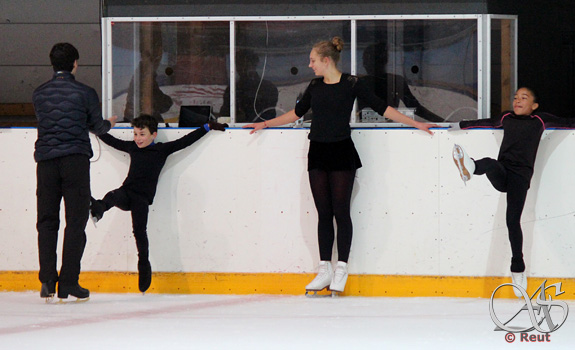
In November 2015, the school's students had a fantastic opportunity to perform on a larger stage alongside Stéphane, who was responsible for creating the ice segment of the "Champions!" show organized by the city of Lausanne and the canton of Vaud to celebrate the centenary of the IOC's presence in Lausanne.
August 2016: First international senior student
Deniss Vasiļjevs was the school's first international senior student; he joined the school ahead of the 2016/17 season. The Rostelecom Cup 2016 marked their first competition together and Stéphane's first official outing as a coach at the senior international level. Many were surprised to see Stéphane suddenly in Moscow, and even more so when he appeared on the other side of the boards.
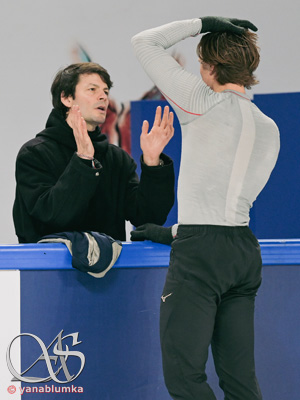 "I did go to the Nebelhorn Trophy with Denis Ten (in 2012), and that was even before Champéry. So that was probably where it all started... For me personally, my commitment was already full on before Deniss joined us," Stéphane clarifies. "Of course, Deniss was special, and I felt a lot of similarities with him and his story. I felt a connection with him and his personality, which probably helped me commit to being his full-time coach. However, I think my commitment to the school was already at maximum potential.
"I did go to the Nebelhorn Trophy with Denis Ten (in 2012), and that was even before Champéry. So that was probably where it all started... For me personally, my commitment was already full on before Deniss joined us," Stéphane clarifies. "Of course, Deniss was special, and I felt a lot of similarities with him and his story. I felt a connection with him and his personality, which probably helped me commit to being his full-time coach. However, I think my commitment to the school was already at maximum potential.
From the very beginning, it didn't really matter what level my students were; it still doesn't matter. I'm not looking for famous skaters. I'm looking for skaters who want to learn, work, and perform - those who have the potential to develop. I actually enjoy teaching at any level; I work with skaters from the 'Learn to Skate' program and students from the schools in our region. Yes, I actually started by working with the Japanese national team and very advanced kids, but to me, any level is interesting and presents its own challenges. I never pictured myself as an elite coach or a beginners' coach; I just want to help any skater.
Adult skaters haven't been where we've focused much energy yet, but that's something I have done as well. When Lewis Gibson invited me to a seminar in Scotland, it was a very interesting experience, because young kids are usually brought to the rink by their parents. Adult skaters, however, decide for themselves that they want to learn. They take that very seriously, organizing their time around their jobs and lives to make it happen. Sometimes, they are even more intense about it than skaters who compete.
So, really, any level. I've worked with ice dancers and pairs; I even worked with a synchro team in Sweden. 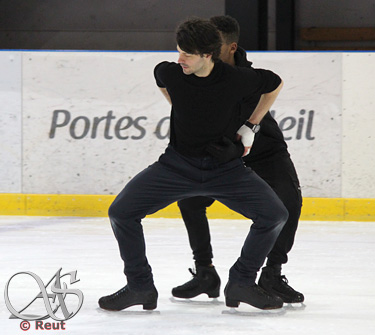 I truly enjoy working at any level and in any discipline. When I was conducting a pairs seminar in Berlin with Peter, learning from the pairs' coach, I understood how different it is - you need to learn how to hold, make the lifts, and execute the throws. It's something I never thought would be so different! It is still figure skating, but there are so many new things to learn. Skating has offered me countless opportunities to learn, and I'm still learning today. Even 10 years after starting the school, I remain eager to continue on this journey! I still want to know more!"
I truly enjoy working at any level and in any discipline. When I was conducting a pairs seminar in Berlin with Peter, learning from the pairs' coach, I understood how different it is - you need to learn how to hold, make the lifts, and execute the throws. It's something I never thought would be so different! It is still figure skating, but there are so many new things to learn. Skating has offered me countless opportunities to learn, and I'm still learning today. Even 10 years after starting the school, I remain eager to continue on this journey! I still want to know more!"
March 2022: First World champion
The Rostelecom Cup became pivotal in Stéphane's coaching career once again when, in 2019, he decided to chaperone and assist Shoma Uno, who was coachless at the time and had come to Russia after a disastrous first Grand Prix event in France. This marked the beginning of a beautiful chapter in both of their lives, as Stéphane helped extend Shoma's career for a few more fruitful years. With Stéphane by his side, Shoma went on to win three more national titles, the Grand Prix Final, two World titles, and two additional Olympic medals. "It was hard for him to find the motivation," Stéphane says. "But I think he found his way up very well, and he worked so hard! I admire him so much for that."
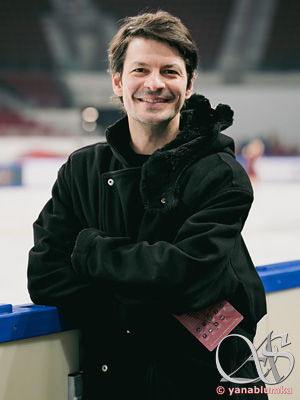 Did Stéphane imagine, when he opened his school, that in ten years he would be coaching an Olympic medalist and a World champion? "Not at all. And it was never a goal," Stéphane replies.
Did Stéphane imagine, when he opened his school, that in ten years he would be coaching an Olympic medalist and a World champion? "Not at all. And it was never a goal," Stéphane replies.
There is something else in a skating career that he values much more. "I never expected to bring Deniss to where we are now, on the road to his third Games. [In Montreal,] Deniss and Shoma were the boys in the men's category with the most participations at Worlds; they have competed at every Worlds together since Boston! (In Boston 2025, Deniss was among a few skaters returning and the only one in the men's category - ed) It's beautiful to see that theirs has been a long career; it is worth more than the World champion title or the medals. It is so special."
After Shoma's retirement, they have remained in touch. Shoma took part in Stéphane's show in Champéry, even though this meant he had to miss the medal ceremony organized for him and his teammates during the 2024 Paris Olympics due to a scheduling conflict. Later that month, they performed in the "Friends on Ice" show in Japan, skating a touching number together to "Fall On Me" by Andrea and Matteo Bocelli.
"Skating with Shoma last summer was a highlight for me," Stéphane recalls. "I enjoyed just looking at him, looking into his eyes and seeing his smile. We shared such a wonderful moment. I was just very happy to skate with him. His eyes were so inspiring - I loved seeing his emotions, and it was just a good moment. After all those years together, it was good to have this moment."
Many more beautiful moments lie ahead, as Stéphane is set to appear in Shoma's show, "Ice Brave," this June and July.
Champéry: a place to return to
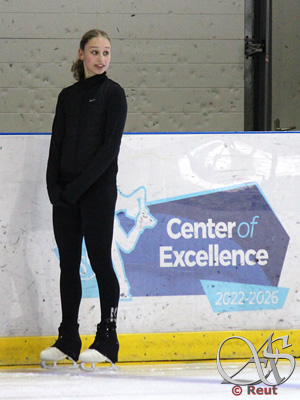 Postcard-perfect and bucolic, Champéry has become a safe haven and a place skaters from all over the world love returning to.
Postcard-perfect and bucolic, Champéry has become a safe haven and a place skaters from all over the world love returning to.
Sofja Stepčenko admits this is an ideal atmosphere for her to train in: "I really love the views; the rink is so beautiful. It's a quiet, remote place - a small village, very peaceful - so you can fully focus on your work without distractions. Personally, I feel more comfortable in quiet places. I don't like the hustle and bustle of big cities, so Champéry ideally suits my state of mind. It allows me to train calmly and continue developing."
Sofja joined the Skating School last summer, but the season didn't go smoothly for her, ending in a disappointing 30th place in Boston. "When I moved to train with Stéphane, I didn't set any specific expectations," she says. "I wanted to try something new, change the environment, put more emphasis on components rather than the technical side of my skating, and revisit my overall attitude towards figure skating. So I can't say I had big plans for this season - although, of course, you always plan and always want the best outcome possible.
Now is the time to sit down with my coaching team, analyse this season, figure out how to structure my preparation for the next one, decide what should be changed, and define my overall plans moving forward."
Deniss Vasiļjevs spent almost his entire senior career at the Skating School. When asked about the most important thing he learned there, he chooses: "Respect for the past."
"The most important thing I wish we would see more in figure skating," he elaborates, "is attention to bringing the best from the past, without trying to completely replace it with a new vision. 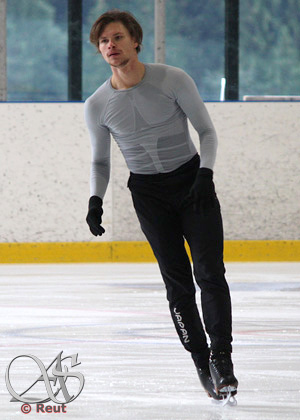 We need to bring back the elements that encouraged people to watch figure skating, that shaped the industry and the mindset.
We need to bring back the elements that encouraged people to watch figure skating, that shaped the industry and the mindset.
I believe it's emotion that connects people, that draws them in to watch. It's something TV tries to capture but never fully can. That's why being in a massive arena makes me realise how genuinely unique it is to experience figure skating live. I really wish more people would come and see it for themselves.
I feel that at the school we are being taught to always appreciate the people and to put them first, ahead of 'do your job and go home.' I believe this is a significant change that could improve figure skating in many ways. And all this is not exactly something new. Perhaps the European culture of figure skating has always been more attentive to it. It's truly one of the greatest things from the past that I feel has somewhat diminished today."
Lara Naki Gutmann loves coming back to Champéry a few times each season: "From the very beginning, I liked their working style and technique. My coach enjoys collaborating with them, too. Champéry is a lovely place, and every time I go, I learn something new and gain a fresh perspective."
Gerli Liinamäe also used to be a frequent visitor at the Skating School, training at their summer camps, coming for choreography, and dropping by during the season whenever she wanted to "go to the mountains to train."
"I felt that the coaches here treated each athlete individually, taking them as they are. A lot of places have the same structure for everyone, but here it's different for each skater. It's about how they approach each student mentally, even more than physically."
 Gerli originally planned to complete a full 2023/24 season before retiring - something she had mentioned at Nebelhorn Trophy. It was also in Oberstdorf that Stéphane first brought up the idea of her joining their coaching team. Later that season, after suffering a stress fracture in her foot and deciding against surgery and the long recovery that would follow, she chose to retire earlier, after the Estonian Nationals. January 2024 was the busiest month for the school, and they needed extra help. Gerli came for a trial period, initially for just one month. At that point, nothing had been decided on either side.
Gerli originally planned to complete a full 2023/24 season before retiring - something she had mentioned at Nebelhorn Trophy. It was also in Oberstdorf that Stéphane first brought up the idea of her joining their coaching team. Later that season, after suffering a stress fracture in her foot and deciding against surgery and the long recovery that would follow, she chose to retire earlier, after the Estonian Nationals. January 2024 was the busiest month for the school, and they needed extra help. Gerli came for a trial period, initially for just one month. At that point, nothing had been decided on either side.
"Still, it was a big change," she recalls. "Plus, I was still living in Estonia, and my life was mainly there. Moving and adjusting to everything was a bit complicated at first.
The first time I stepped into the coaches' dressing room, it felt weird. As an athlete, you naturally keep a bit of distance - it's the coach-student relationship and all that. And, of course, when I had my first lesson with Deniss, it felt a little bizarre. I was like, 'What the hell am I gonna do with you?' (laughs) But I just did what I needed to do. He was also in shock when he first saw me. 'What are you doing here, on this side? Wearing the coach's jacket?' And I answered, 'Oh, but I'm a coach now!'
So, yeah, it was funny at first. But during that first practice with me, he landed a quad Salchow. So he was happy, I was happy, the staff was happy. Stéphane was happy and joked, 'Oh, you're hired!'"
The ISU Center of Excellence
Angelo Dolfini serves as the main point of contact and representative for Champéry in the meetings held with other centers every two to three months. He is also responsible for all activities related to this aspect of the Skating School's work.
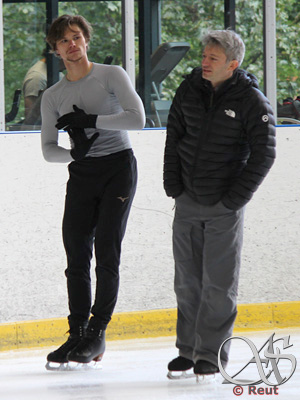 "The internship program is one example of what we do as a Center of Excellence," he explains. "For instance, we had OlĂvia Lengyelová from Slovakia, who came for a couple of weeks. Then she returned and did a program with Stéphane. We also had a skater from Singapore.
"The internship program is one example of what we do as a Center of Excellence," he explains. "For instance, we had OlĂvia Lengyelová from Slovakia, who came for a couple of weeks. Then she returned and did a program with Stéphane. We also had a skater from Singapore.
Any nation can apply, but of course, there are priorities. We try to give preference to developing nations - those with fewer results, less visibility, and where skating as a movement is less developed. But the program is open to everyone. We can't accept all applications; the number of spots is limited, usually just a couple per center. It also depends on the discipline - pairs, for example, would typically choose to go to Bergamo or Oberstdorf. And some countries are closer to the Bangkok center. Overall, I think it's a great initiative.
Another project we organised was a Joint Camp. We had one coach coming from Oberstdorf, one from Bergamo, and several coaches from Champéry also took part. It was mainly me, but Giulia (Isceri) was also involved, and Stéphane led a couple of masterclasses, while Lesli Wiesner helped with the ballet lessons. The three European centers are trying to collaborate more, and this was the first time we did something like this. The camp was open to students and coaches from all over Europe. We sent invitations to all European ISU members, and I think it was a big success - the kids were happy, and we were happy.
I really loved it. It's important for us to work together as centers, and it's a great opportunity for coaches to exchange ideas. The ISU is supporting us, of course, 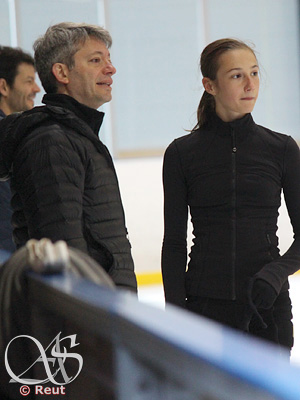 which meant it was relatively inexpensive for the students and a very valuable opportunity for them. So we want to do it again - extend it from five days to six. We also thought about holding one week in Champéry and then another week in Oberstdorf."
which meant it was relatively inexpensive for the students and a very valuable opportunity for them. So we want to do it again - extend it from five days to six. We also thought about holding one week in Champéry and then another week in Oberstdorf."
Robert Dierking, who decided in 2020 to pursue a career as a national team coach for German singles skating, remains in touch with his former team. During the Joint Camp last June, he represented the Oberstdorf center.
"I think it's fantastic," he says when asked about the progress the Skating School has made. "I've heard about how the team has transformed and expanded - it's breathing, it's living. It's wonderful to hear about the frequent presence of Ghislain Briand (a Canadian coach and one of the most prestigious jumping coaches in the skating world - ed). They're still working with Kenta Kojiri (a Japanese dancer, artistic director, and choreographer for ballet, opera, musicals, and figure skating - ed), along with several other dancers. It's great to see these people and all these elements still being involved.
When I was there in June, it was my first time back on the ice in Champéry since I left in 2020, and it still has that homely sense - it hasn't been lost. I'm happy they've managed to preserve that."
What's next?
In ten more years, where will the Skating School of Switzerland be, and where should it go?
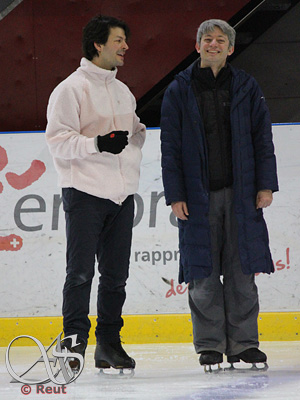 Angelo Dolfini strongly believes in deepening connections with the ISU, representatives of its Technical Committees, and judges - working together and shaping a shared vision.
Angelo Dolfini strongly believes in deepening connections with the ISU, representatives of its Technical Committees, and judges - working together and shaping a shared vision.
"We held a workshop with Patrick Meier joining us - it was the first time a member of the Technical Committee participated. Before that, during the workshop in Bergamo, Fabio Bianchetti joined in, but he wasn't present during the workshop itself.
We also had Leena Laaksonen (one of Finland's top judges) attend our Joint Camp. She gave seminars and lessons on the new rules, and she did a terrific job on the ice as well, monitoring elements. The skaters really appreciated her insights - it was very helpful for us, but I think it was also valuable and interesting for her to see the work on the ice and exchange ideas with the coaches.
We're just getting started, and the idea is to help each other - to start a discussion. It's important that we share the same vision and understand that we all want to move figure skating forward. And, yes, maybe sometimes they think about certain rules or new features, they have something in mind, but in reality, it turns out differently. So the idea is that some of those changes could be tested with students in the different Centers of Excellence to see how they work. Then, they can evaluate whether this is the direction we want to take or not.
Working together can help the sport evolve - and that's the goal."
Another direction Angelo thinks the school could take is developing a strong junior team: "I think we have some potentially good junior skaters, which hasn't always been the case, and this is an area we can develop further. And I'm not talking about big numbers - that's not the goal. We want to keep the group fairly small to maintain this level of involvement and personal attention.
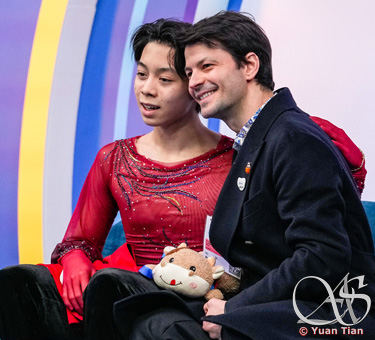 Generally speaking, it's always good to have elite skaters, and we've focused on that a lot. We also have our local students in the novice category. But now, I think we have some strong juniors, and it's important to build on that."
Generally speaking, it's always good to have elite skaters, and we've focused on that a lot. We also have our local students in the novice category. But now, I think we have some strong juniors, and it's important to build on that."
Thinking about what the next ten years will bring, Stéphane, who recently turned forty, offers a more abstract answer: "In general, I don't make many plans, but I do set deadlines sometimes. Like, for example, by 2034, I will be 49, and I see that number as a special one, it feels important to me - a key moment I see ahead.
It's a bit the same for the past, too. When I look back, 2010 - the year I retired - was always a key moment for me, even beforehand. That year, when I was 25, was very important. And maybe each decade has its own meaning. It's been ten years for the school, and we had this show in Champéry in the summer, which was also a big thing for me. I really like these deadlines; they give me a sense of rhythm, of chapters. But within each chapter, I'm happy to simply live through the experiences that come my way."



